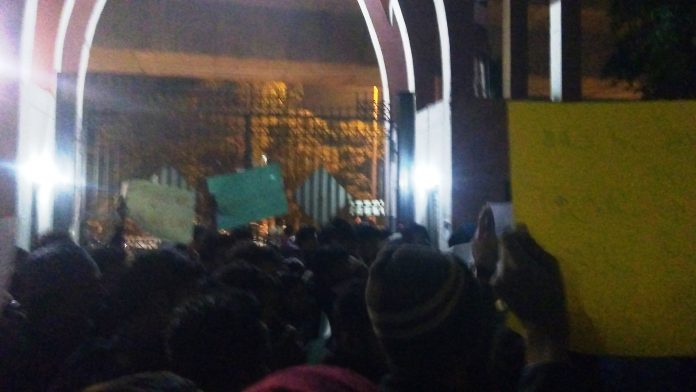Text and Video by Atul Anand, TwoCircles.net
On Tuesday, Jamia Millia Islamia (JMI) University students participated in a protest gathering called by Muslim Students Federation (MSF) against the “anti-Muslim provisions” of the Citizenship Amendment Bill (CAB) and National Register of Citizens (NRC). The Bill is reported to be discriminatory against Muslims and would potentially create a situation where Muslims would be legally treated as secondary citizens in the country.
A large number of students attended the protest gathering at the University. They rejected the Bill which goes against the secularism ensured by the Indian constitution and pledged to protect the constitution. Students raised slogans such as, “India belongs to all” and “Say no to Hindu nation”. Many protesters called upon the constitution and B. R. Ambedkar to fight against the CAB. Ateeb Khan, national secretary of MSF, shared his concern, “The Bill is against the Muslims of India. After this Bill, NRC will be introduced across the country to make terrible conditions for Muslims”. He mentioned crimes against humanity by Nazi German camps and warned against the similar possibility in India.
Jamia Teachers’ Association (JTA) also condemned the Bill. In a statement, the secretary of JTA Majid Jamil said, “The government has designed the Bill to exclusively target the Muslims. Jamia has played a great and decisive role in the freedom movement of India. The time has come for the nation to protect the constitution and the very spirit of national constitution”. JTA has called for a protest on the campus on December 13.
According to various reports students at different universities across the country such as Aligarh Muslim University, Indian Institute of Technology – Bombay and the University of Hyderabad have been protesting on the issue. On being asked about the follow up on the protest, MSF -JMI President Tariq Abrar said, “We will wait to see if the Bill gets passed in the lower house. If it does then we will take our fight to the streets and to the Supreme Court.”


